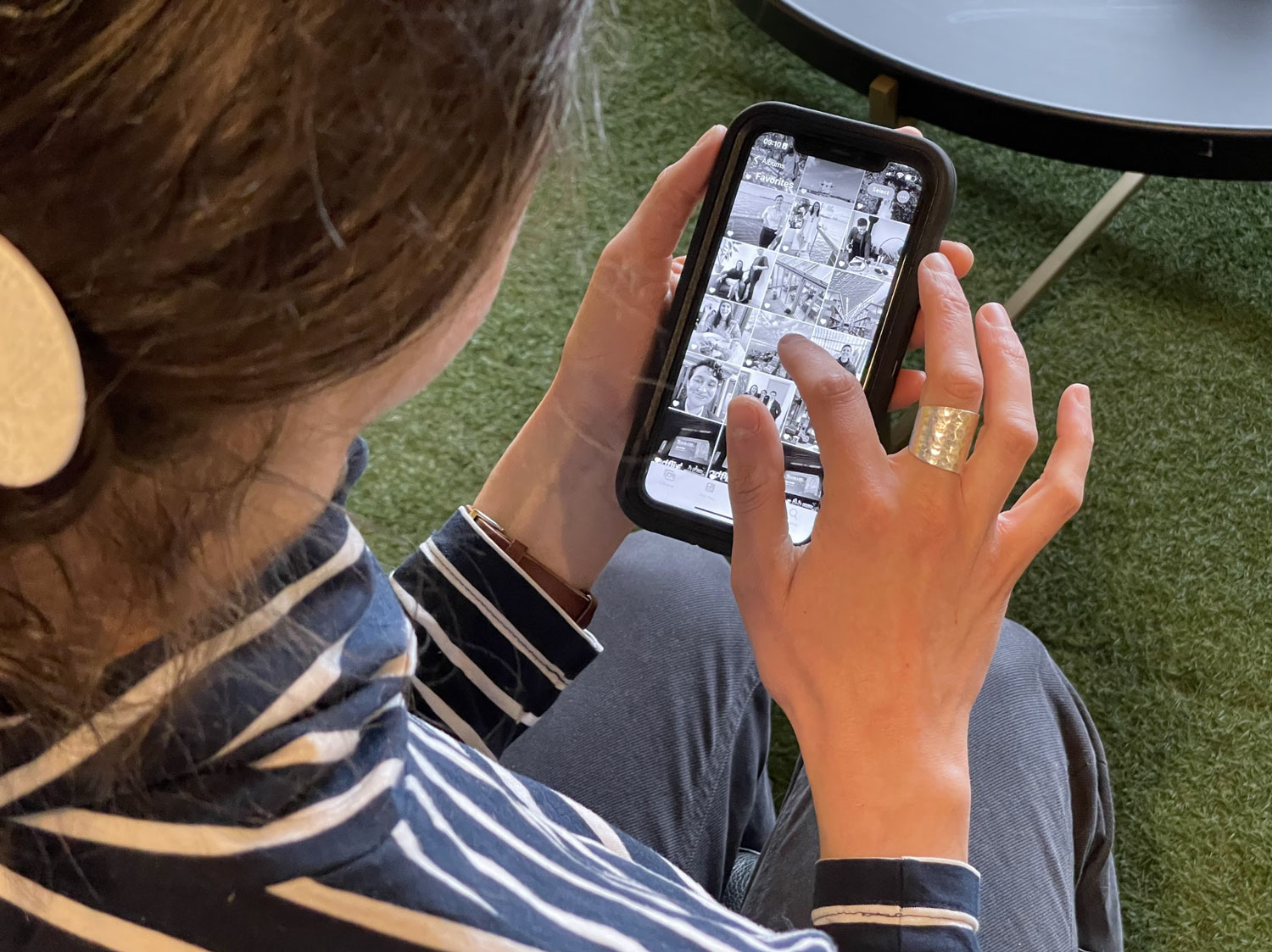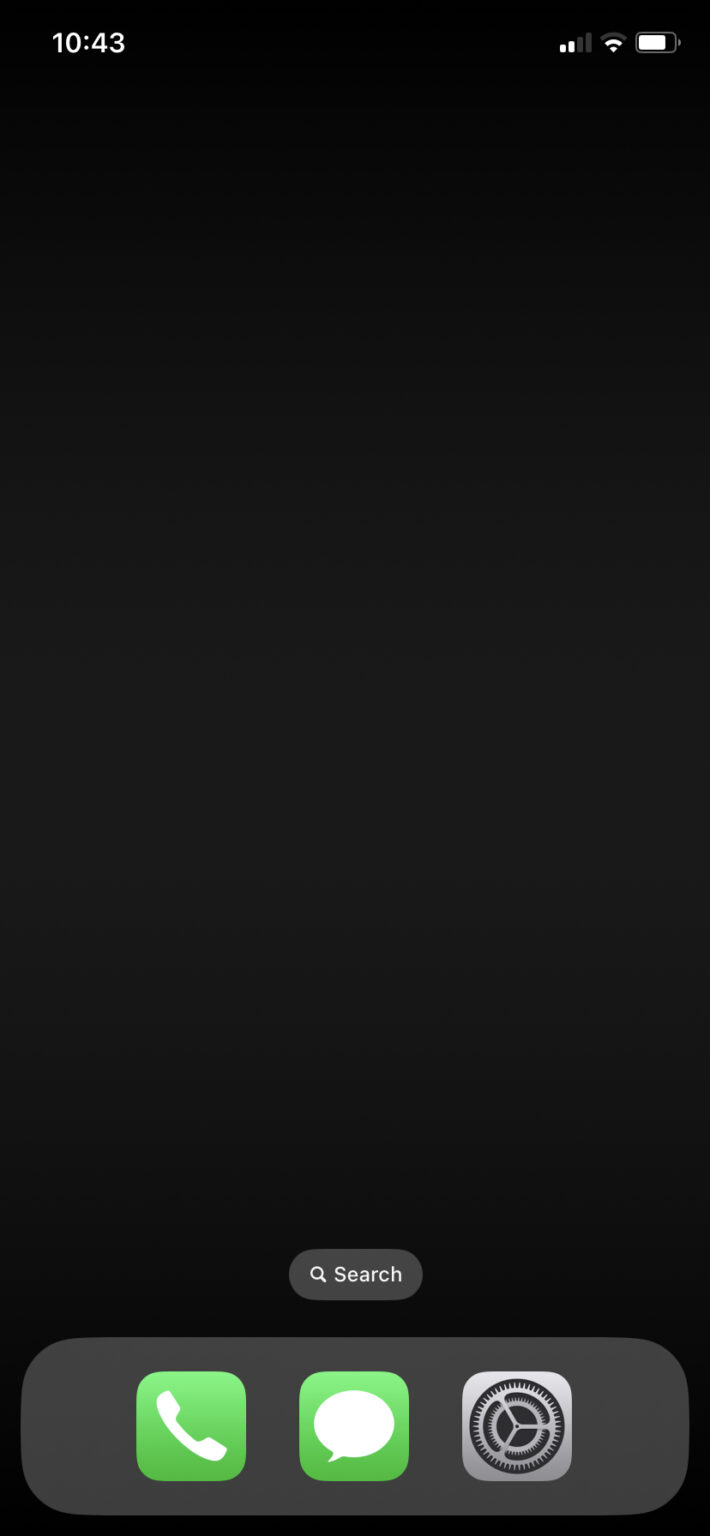
One Dumb Phone
Beal St. George
A few months ago, I made my smartphone a dumb phone. I switched the display to grayscale, got surgical about removing any app upon which I’d developed a penchant for scrolling (I’m looking at you, New York Times), and hung new wallpaper, an Apple-provided option: all-black fading to gray toward the bottom. When I showed a friend the next day, he exclaimed, “you could’ve kept a nice picture at least! I mean, we had those on our flip phones sometimes… this just looks like staring into the void.”
It’s harder to do than it might seem at first: our world is set up around these devices now, and their grip on us is grounded in ubiquity and necessity.
Luckily, I’m not alone, part 1: plenty of people are using their actual brains and computers to write useful guides to breaking up with our smartphones. This one saw right through me, minced no words: “Your smartphone has ruined your life. You’re hopelessly addicted to the empty dopamine drip doled out by algorithms that know you better than you know yourself.”
This, of course, was true. And as is so often the case when we’re not yet willing to accept something: I knew it, intellectually, but I didn’t know it in my heart (see above death spiral: the algorithms keeping our nervous systems on life support). So I approached the process of breaking up with my smartphone in much the same way: eyes askance, a little suspect. But nevertheless, I started unwinding my phone from all of its bells and whistles, its apps and tools. As I started telling people about it, my attitude wasn’t all-or-nothing. I thought I’d “see how it went” for, maybe, a couple weeks.
I’m not alone, part 2: my sweetie was the early adopter. (Early = the night before me.) I woke up to screenshots of her phone without its apps, and this moment of solidarity was enough to know I’d try it. I still didn’t know if it’d last. My brain was chattering: I have a job in marketing! How dare I be so bold as to be unplugged some of the time! What if urgent things come up, and people need to reach me? What if I’m not constantly available to attend to other people’s needs as they intrude upon my own time?
I removed my email (work and personal)—and I don’t mean I relegated the Mail app to the folders section of the phone. I deleted it. I turned off the Internet browser function: no more using Safari as a stand-in for my own brain (“what is the best substitute for fish sauce?”), my own “figure-it-out” skills (“what’s the fastest route from here to Wegmans?”).
I originally also deleted the appointment calendar, and within a day I’d forgotten about the plans I’d made with the friend at the bar the night after I’d turned my smartphone dumb. My first mix-up. Gently, I thought to myself, there will be more of those!
(I later decided to return my calendar to the screen—it wasn’t, especially without email on the phone, an addicting app. And while I’m taking this aside, I’ll add: more attention should be paid to the power of viewing your screen in grayscale. It’s a lot less pleasant to look at, which means you put it down a lot more often. The battery life benefits are also not to be discounted.)
Of course, I also bade farewell to the fickle friends we all love to hate: the social media apps. I know—yawn! Been there, done that! I’ve failed at this more times than you’ve tried!
Bye-bye Facebook (I’ll miss scrolling your Marketplace, waiting for mid-century modern treasures at mid-century prices). Bye-bye Instagram (this time, I mean it: we’re breaking up)! Bye-bye BeReal, you final social media frontier, you supposed gateway to authenticity on the Internet, you naughty app, goading me into keeping notifications on so I’ll know when it’s time to Be Real and then pinging me seventeen times every day when others post. Bye-bye LinkedIn (contradictory—personal? professional?, braggy, expensive). Bye-bye TikTok (you used to make me laugh, now you make me sad because you’re always selling me things).
I don’t think I’ll ever go back.

I still use email and social media and the Internet, broadly, on my computer. But it’s a lot harder to catch yourself doing mindlessly. When there’s nothing to “check” on my phone, I reach for it less. Instead, I pick up a book. Or—and I mean this, truly—I just exist. Sometimes what replaces phone time is just nothing.
When I scroll or post on Instagram now, it’s because I meant to. And I do it with a removed perspective that has only been afforded me by my distance from it. Thank you to my friends who are still posting photos of their lives. You are the rarest, sweetest birds—made even sweeter by the recognition that there’s very little else of value on the platform anymore. All social media platforms have their times and their trends: we moved from Facebook, to Instagram, to TikTok… but when the platforms change, so do our connections: as long as these apps are the way we reach each other, we’re still letting them be in charge of who we’re interacting with.
If someone texts or calls me, I know they meant to reach me. Likewise, I have to mean it when I’m reaching out to a friend, rather than assuming the increasingly attenuated heart-eyes reaction! to their Instagram story. And, as far as my job goes: yes, I’ve redownloaded Instagram to post when I’ve needed to. But then it goes away again. Part of my profession is being creative: I find this is much easier to do when I’ve got built-in boundaries to distraction and comparison. (Even without a smartphone, there are still plenty of ways to be distracted, I promise!)
Most of the people I tell about my dumb phone react in the same way: “good for you!” they say, with a glint of suspicion in their eyes. An implication? “Sounds nice… I could never do that.” But if you’ve ever had even a passing thought about trying a dumb phone: I highly recommend it. With a disconnected phone, I’m much more connected to my life. It’s uncomfortable at first, but that goes away.
The more distance I have from that constantly networked way of life, the less it tugs on my sleeve. And the easier it is to ignore when it does. I’ve also got a meditation practice that, daily, causes me to investigate what is real in each present moment. It has helped this adjustment feel a lot less isolating.
I spent a decade (⅓ of my life!) living with a smartphone. Always connected to the hidden observers of my life: algorithms, predictive search models, social media networks. It would be incorrect to say those forces have gone away—they can still reach me on all my other connected devices. But I’m reclaiming a little bit of separation from them, and as a result, I’m living more for myself. The algorithms are over there, and I’m over here: just a person, with my own mundane life, thinking more of my own thoughts, watching spring emerge, and—without a world of answers at my fingertips—wondering more.
